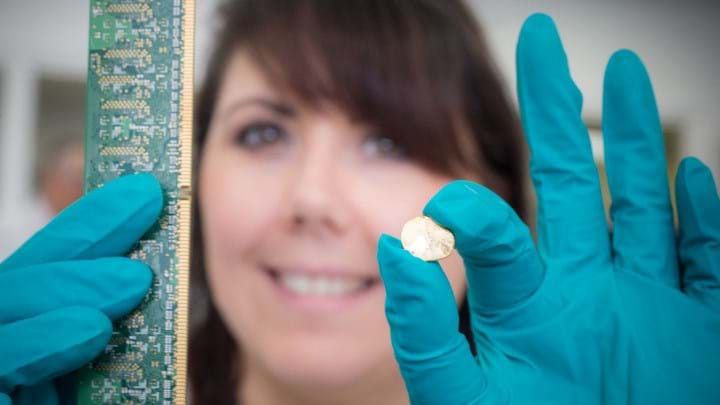What to read while we’re away
WITH The Chemical Engineer team poised to close our laptops until the office reopens on 2 January, we thought we’d share a selection box of stories to catch up on while we’re away.
Christmas TV schedule

First up, it wouldn’t be Christmas without a debate about what we should be watching on TV so here are a few engineering-related options. The new Wallace and Gromit film is an obvious priority for the inventors among us as the bumbling tinkerer and his long suffering dog return to British screens on Christmas Day to fend off an old foe and wrestle back control of artificial intelligence run amok.
But what about human intelligence this Christmas? Well, for me, a priority watch has to be the festive series of University Challenge. For this self-confessed quiz nerd, the Christmas special is a traditional must watch and it’s (somewhat) easier than the regular series, so I end up feeling (somewhat) brighter. But more exciting that that is the news that this year’s seasonal special features a team led by IChemE member and longtime TCE contributor Yasmin Ali. Yasmin caught up with our reporter Aniqah Majid to discuss the show and her career in chemical engineering here.
If you prefer a lateral thinking quiz, then look no further than the BBC’s Only Connect. IChemE member Mike Lee makes a comeback as team captain of the Vikings in a royal-themed special that aired on 23 December and is available to watch on the BBC’s iPlayer.
Given my lack of knowledge of non-UK TV schedules, and a growing fear that I may be losing those of you without access to the BBC (other TV channels are available), let’s hastily return to the written word.
Your Engineering New Year’s Resolutions

If you haven’t yet caught the latest issue of the magazine (you can read it online here) then you may have missed the New Year’s Resolutions that the TCE reader feedback panel and chairs of IChemE’s SIGs are setting for themselves and the wider profession. Read them here, and if you think there are any glaring omissions, email your suggestions to: aduckett@icheme.org
Common among the resolutions were plans to contribute more on sustainability, safety, and a focus on CPD. We have published lots on those topics throughout the year, so here are a selection if you missed them the first time round.
On sustainability, the latest issue looks at how chemical engineers are contributing to a greener dairy industry. This includes a case study on how to electrify a food production facility and why we need to think differently about the ways we calculate the sustainability of our food and drink.
For students and lecturers looking for a useful resource on how the design process works in industry, then look no further than Tom Baxter’s four-part series for graduates which ends with a list of opportunities that engineers have to boost sustainability and a call for graduates to push back against the status quo.
Elsewhere this year, we spoke to engineers who designed and built a new plant that recovers gold from waste electronics; published a series of articles about efforts to suck CO2 from the air; and heard from engineers calling for the profession to take up the crucial challenge of reducing nitrous oxide emissions from the water industry; and heard how members in Malaysia are pushing to make palm oil more sustainable.
Safety moments
2024 has been the 50th anniversary of the Flixborough disaster and the 40th anniversary of the Bhopal tragedy. We’ve reflected on the lessons learned, the personal experiences of those who survived and worked to deal with the aftermath, and asked questions about what fresh fears we face in the need to protect people and environment from our industrial hazards.
The sad truth is that the toxic legacy of Bhopal persists today, and there are fears that the belated efforts to clean it up might bring the tragedy to new communities in India. Read about the recent calls for action here.
Bhopal was never far from our minds during IChemE’s Hazards process safety conference this year. If you didn’t follow our live reporting from the event but are keen to recap the major talking points, then you can catch our coverage here. It includes audio interviews with speakers on topics as varied as whether climate change has already pushed your plant beyond its design limits; and the need for our safety community to help clean technology entrants understand their hazards. There was also many discussions about the role that AI has to play in improving safety.
Artificial intelligence

Of course it’s no surprise that AI was a key point of discussion at Hazards. The technology is becoming so widespread as to touch most aspects of engineering. Its helping engineers accelerate the development of fusion energy which will likely be needed to keep feeding energy-hungry AI; its being used to discover long-abandoned oil wells; it’s helping lecturers merge teaching and assessment; its prompting universities to launch new engineering courses; and of course it has sparked warnings about contract cheating.
Career development
We asked readers at the start of the year what more we could do to help with your career development.
Students asked us to help them ace their final year design project and how to succeed on industrial placements.
Early career engineers asked for guidance on mentoring; dealing with imposter syndrome; and insights on career opportunities in other sectors including heat networks and the nuclear industry.
And of course we’ve also shone a spotlight on those who have been recognised by IChemE for their chemical engineering excellence. We had the winners of last month’s IChemE Global Awards. And there were the three inspirational young engineers who won recognition at IChemE’s inaugural Young Engineers Awards for Innovation and Sustainability (YEAIS).
If you’d like to put yourself forward for future recognition or nominate others then why not enter the 2025 YEAIS – the judges of last year’s awards offer their advice here. Or nominate a speaker for the prestigious Danckwerts lecture.
IChemE will soon be asking for nominations to join either the Board of Trustees or Congress. You can find more information here.

I’ll close with a big thank you to all the volunteers who have worked so generously with us over the course of 2024. It’s been a landmark year. We published or 1000th issue and it was moving to read reflections from readers on what the magazine has meant and how it’s helped throughout the course of your careers. You can read the retrospective here, along with our own reporting on the feedstocks used to make the magazine, the printing process, and how the design process has evolved in response to technological upheavals.
We look forward to working with many of you again throughout 2025. In the meantime, here’s wishing you a merry Christmas.
Recent Editions
Catch up on the latest news, views and jobs from The Chemical Engineer. Below are the four latest issues. View a wider selection of the archive from within the Magazine section of this site.




